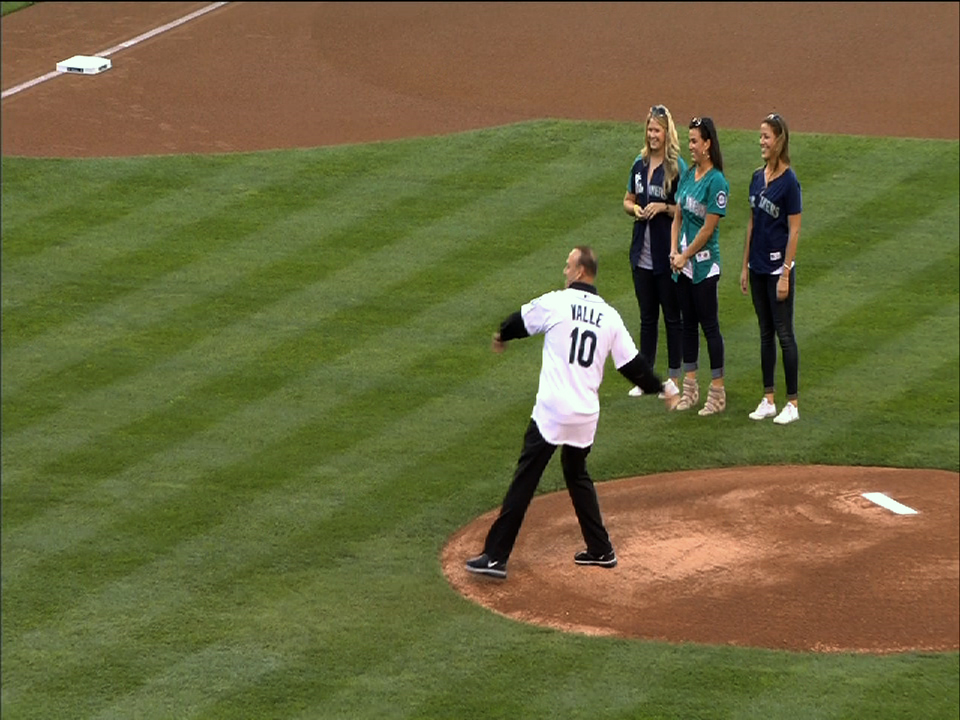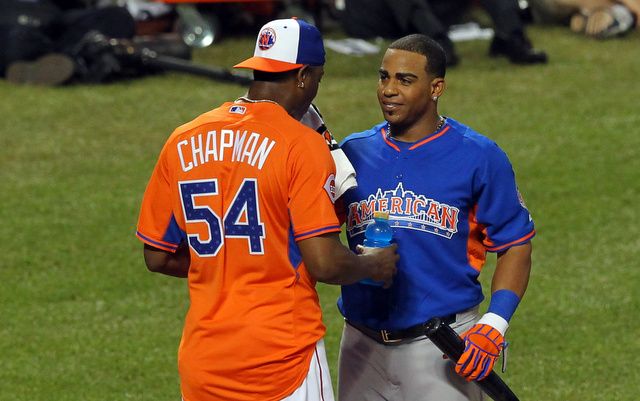I read this Dave Valle story a few months back:
Difference Maker
Dave Valle plays on a new field: microloans that help to end poverty
As a pro baseball player in the Dominican Republic Dave Valle saw poverty up close. Now his microloans are helping to end it.
By Gail Wood, Contributor / May 24, 2013
The Christian Science Monitor
Weekly Digital Edition
Because he was a professional baseball player, Dave Valle figured the eight boys crowding around him after a winter league game in the Dominican Republic years ago just wanted his autograph
He was wrong.
"They were hungry," Mr. Valle says.
The boys, most of them shirtless and shoeless, were begging for food, not autographs. Wanting to help, Valle asked a woman selling grilled chicken on a street corner outside the wooden-bleacher ballpark in Santo Domingo to cook up everything she had. It cost him $5.
"We met an immediate need," Valle says. "But we didn't really come up with any long-term solution. In four hours, they were going to be hungry again."
It was 1985 and Valle, who at the time was a minor-league catcher in the Seattle Mariners farm system making $9,000 a year, promised himself that one day he'd return to Santo Domingo and help more.
He's kept his promise. Today, Valle is in the business of changing lives.
In 1995, he founded Esperanza International, a microfinance outreach effort that gives small loans to the poorest of the poor in the Dominican Republic and Haiti, which occupies the other half of the Caribbean island of Hispaniola. Over the past 18 years, Esperanza has provided $38 million in loans, helping thousands of families put food on the table and break the cycle of poverty.
"When I think of selfless people, I think of Dave and his wife, Vicky," says Kayla Villnow, once a volunteer with Esperanza and now a full-time fundraiser and coordinator with the foundation. "They've built an organization that's served hundreds of thousands of people. It's amazing."
Esperanza, which is Spanish for "hope," gives loans averaging $220 to people living in poverty. They use the money to start a small cottage business such as selling food, tailoring clothes, or making crafts to sell on a street corner. Over the years Esperanza has helped create 69,840 businesses and it has an active client list of 16,462.
"I have watched Esperanza grow and have seen lives change because of the services Esperanza offers," says Sandra Stull, who began volunteering for Esperanza in 1998. "Esperanza is amazing."
Esperanza doesn't give money to the needy; the money must all be repaid – with interest. The foundation offers a hand up, not a handout.
"We've learned that when you give something away for free," it's not really held in high regard, says Valle, whose 12-year professional baseball career ended in 1996 with the Texas Rangers. "They look at the loan as a lifeline."
Amazingly, while the loans are given to people who have been surviving on an average of $2 a day, 98 percent of the loans are paid back. That money is then loaned again. "It's the gift that keeps on giving," Valle says.
Eighty-seven percent of the loans go to women. "Women are better credit risks," Valle says. "They're also the ones who take care of the children. Or the grandmas."
As a support, Esperanza starts business groups ranging in size from 20 to 30 people who share the same challenge – poverty. These groups act as a kind of bank. Within each group the borrowers elect a president, a treasurer, and a secretary. Every two weeks, they come together to make their loan payments, share updates, and give support.
"Whoever is unable to pay on their loan, the rest of the group has to pay it," Valle says.
The group members take pride in being able to meet those payments despite their poverty.
"When you don't have much materially, the one thing you do have is your name and your reputation," Valle says. "That's really a motivating force to work and to repay their loan."
This semimonthly "stockholders' meeting" begins with a prayer of thanks and is followed by a Bible study session.
Esperanza has a staff of 120 based in 12 offices throughout the Dominican Republic. Valle, who also has worked as a broadcaster for Seattle Mariners games, makes seven to 12 trips a year to the country. He's looked into the face of poverty, and he's seen the power of Esperanza.
"There's been a lot of talk about micro-finance over the years," Valle says. "Is it really successful? And I can tell you firsthand that it is. People do break out of the cycle of poverty."
Valle has seen Esperanza transform lives. For example, Rosa Borsi used to sell trinkets in the street. After getting a loan from Esperanza, she opened a small grocery store.
Milan Tapia was a seamstress who earned $100 a month working six days a week at a local factory. With a marketable skill – sewing – Ms. Tapia was able to quit her job, buy a sewing machine using a loan from Esperanza, and begin her own sewing business, selling clothes at a flea market.
"All of a sudden, her business was starting to thrive," Valle says.
With her increased earnings, Tapia took in an 8-year-old boy off the streets and gave him a home. Because he couldn't read or write, she started to teach him. The neighbors heard that Tapia was teaching and brought their children. Eventually, Tapia rented a small building and began teaching two classes, one in the morning and one in the afternoon. She did her seamstress work at night.
Tapia's school grew into 400 students, and she now employs 17 people, which includes teachers, janitors, and cooks.
Valle is duplicating Tapia's program, and women are opening schools throughout the island nation, meeting a huge need since there isn't much of a public school system. The Dominican Republic ranks 162 out of 173 countries in the world in the percentage of GDP spent on public education, according to the CIA's World Factbook.
"The reality is, even someone who is living on a dollar a day will pay for the education of their child," Valle says. "They know the importance of education."
Esperanza's loans to start schools range from $1,500 to $2,000. "It's been an incredibly successful program for us," Valle says. "It's the next step in breaking that poverty cycle by providing education for kids."
As Valle and his wife have continued to connect with communities in the Dominican Republic over the years, Esperanza has grown into a broader services organization, helping out on issues such as health care, food, water quality, and housing. Each year, it arranges for some 200 dentists to make volunteer trips from the United States to the Dominican Republic to offer free dental care. Esperanza has also opened health-care clinics across the island.
"We've seen what Esperanza can do and how it can change their lives," says Vicky Valle. "I get so much more out of it than what I could ever give these women."
Esperanza recently partnered with Dominican churches to start a water-purification program. Esperanza invests as much as $35,000 to build a water-purification system, then teaches a church how to run it. The church sells water for about half the going price.
Esperanza has started 29 water-purification programs across the island.
RECOMMENDED: Think you know Latin America? Take our geography quiz.
"Now the church has this income stream, and they're able to do all these other ministries of compassion in their communities," Valle says. "It's an amazing tool."
Esperanza's goal is to help the neediest of the needy. "People ask us how do we figure who receives a loan," Valle says. "It's the opposite of the way a commercial bank does it. The commercial bank says you need collateral. With us, the less you have, the more you qualify. The more you have, the less you qualify."
Valle says he's amazed at how Esperanza has grown since he and his wife shared the idea 28 years ago. "It's gone beyond my wildest dreams," he says. "It's better than hitting a home run in front of 55,000 people."
• To learn more, visit
http://esperanza.org.
Helping the Dominican Republic or through microloans:
UniversalGiving (
www.universalgiving.org) helps people give to and volunteer for top-performing charitable organizations worldwide. Projects are vetted by Universal Giving; 100 percent of each donation goes directly to the listed cause.
Here are three groups selected by UniversalGiving that help in the Dominican Republic or through microloans:
• Un Techo para mi País works to improve the quality of life of impoverished families in Latin America. Project: Provide one microloan for an entrepreneur in Latin America.
• Develop Africa Inc. encourages development through capacity building and transformational education. Project: Empower small businesses by offering a “hand up.”
• Yspaniola Inc. empowers needy communities of Dominicans and Haitians living in the Dominican Republic. Project: Lead a service-learning trip to the Dominican Republic.







